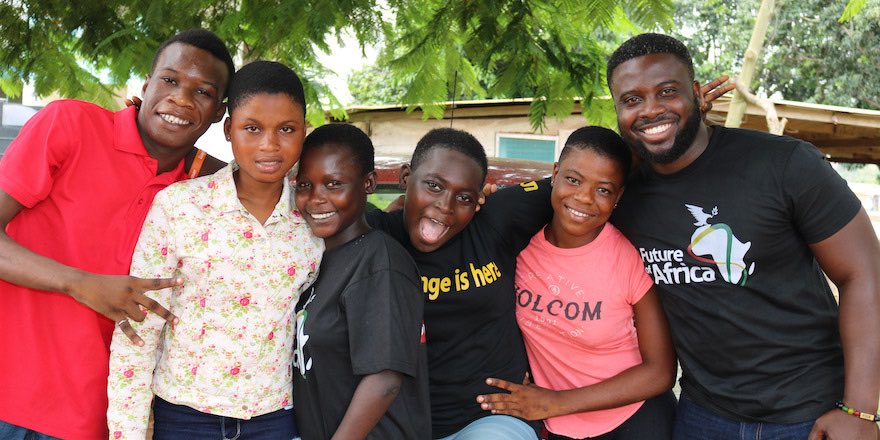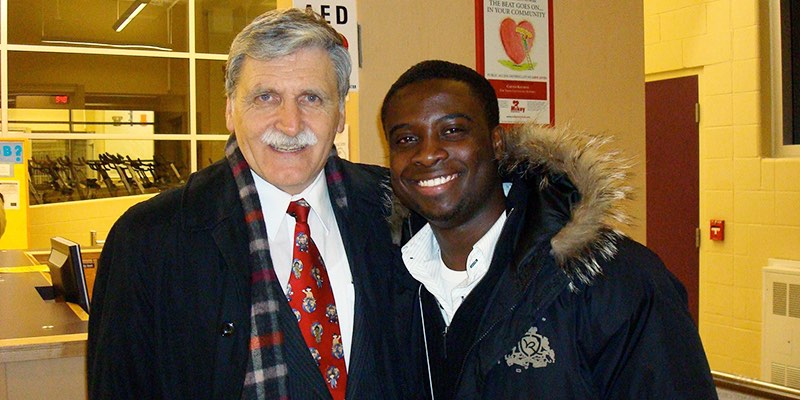Building a Better Future in Africa
Since founding Future of Africa as a student club at Wilfrid Laurier University in 2008, TK Azaglo (BA ’11) has grown the organization to improve the lives of thousands of youth living on the streets in Ghana.

TK Azaglo is living the advice he often provides: “Be the hope you want to see.” Through his organization, Future of Africa, the Wilfrid Laurier University graduate is bringing hope to the lives of young people in his home country of Ghana.
Finding inspiration at Laurier
Azaglo arrived at Laurier as an international student in 2006. During his first year, he says he found many students he met were uninformed about the realities of Africa, even ignorant. Deeply bothered by some of his interactions, Azaglo turned within himself, even denying he came from Africa because he “didn’t know how to respond to all of the comments and questions.”
His perspective changed in 2008 when Romeo Dallaire, the Canadian politician and military officer who led the United Nations peacekeeping force in Rwanda during the 1990s, spoke at Laurier during a global citizenship conference.
“I asked him what he thought the future of Africa was,” says Azaglo. “He said ‘the future of Africa lies in the hands of children and youth who take leadership responsibility for the issues they see around them.’ I was really inspired by what he said, and I responded, ‘I am the future of Africa and I will do everything it takes to make a difference on the continent.’ Everyone stood up and gave me a standing ovation.
“At the end of the conference Romeo called for me and said, ‘You said something really powerful today and I’m interested to see what you do with it.’ That was the beginning.”

Today, Azaglo serves as founder and president of Future of Africa, an organization based in Accra, Ghana that provides life-transforming programs that address the impact of homelessness on young girls and boys, as well as mentors university students, the next generation of Africa’s leaders, cultivating the qualities it will take to drive systemic change.
With 10 full-time staff and up to 60 volunteers on a weekly basis, Future of Africa operates a community centre, as well as safe houses for girls and boys living on the streets. The facilities are the base for programs that focus on health and wellness, pathways to education, skills training, family reunification and responsible citizenship, as well as weekly Sunday evening outreach programs and Wellness Wednesday drop-in events.
Azaglo says Future of Africa programs reach about 500 youth each year, with 80 attending street outreach programs on a weekly basis.
“On the street, we see kids who have been neglected, who have been abused, who feel like there is nothing out there for them,” says Azaglo. “You take these kids and give them a safe place to sleep, where they don’t have to worry about food and don’t have to worry about clothing, and it can change their lives. Through our programs, these children have people telling them that they are valuable, they are loved, they are cared for. And we are demonstrating that in very tangible ways.”
Born at Laurier
Following Dallaire’s 2008 talk at Laurier, Azaglo formed the idea of creating a campus club that would work to educate students about the realities of life in Africa. Fellow student John Tsirimbis took an interest in the idea and joined to support him. The pair pitched the concept to the Wilfrid Laurier University Students’ Union and on Oct. 27, 2008 Future of Africa was approved as a campus club.
In addition to campus events and fundraisers, the club began a program that enabled Laurier students to undertake service-learning placements in African countries.
Upon graduation from Laurier with a Bachelor of Arts in Global Studies and Political Science in 2011, Azaglo had plans to return to Ghana and run Future of Africa as a non-governmental organization. But after being presented the Student Leadership in Internationalization Award from the Canadian Bureau for International Education that same year, he accepted a position working in international student recruitment at Laurier.
While his work at Laurier was fulfilling, including recruiting trips to countries in Africa, the Middle East, Caribbean, and United Kingdom, as well as a stint as global engagement coordinator with Laurier International, Azaglo says he felt a desire to make more of a difference in his home country.
“I was convinced that I wanted to do community development and move back to Ghana,” says Azaglo. “A lot of international students leave and they don’t want to go back because there are opportunities in Canada. But if we are all leaving the continent and not going back, how can we contribute the knowledge and skills we gain to improve our own communities?”
In December 2014, Azaglo moved back to Ghana, taking on the job of associate dean of students and community affairs at Ashesi University. In 2016, he was joined in Ghana by his wife, fellow Laurier graduate Nikki Horne (BA ’06). Horne has played a key role in growing Future of Africa with Azaglo and in 2019 they shared the Award for Community Impact as part of the Wilfrid Laurier University Alumni Association Awards of Excellence for their work with the organization.
Growing Future of Africa
After arriving back in Ghana, Azaglo couldn’t help but notice the many children living on the streets. He decided that once a week he would prepare jollof rice and visit with the kids to better understand their circumstances. Soon, Azaglo invited students from Ashesi University to join him. “I told them, ‘We are not going to learn leadership in my office. Let’s go to the street and immerse ourselves in the nuances of leadership in Ghana,’" Azaglo recalls.
In 2018, Azaglo took a sabbatical from his job at the university to focus on growing Future of Africa full-time. With the help of a $100,000 donation over three years, the organization opened a community centre and has been expanding since. Today, Future of Africa offers youth the opportunity to break the cycle of poverty by introducing them to opportunities in education and skilled work including hairdressing, leatherwork, dressmaking, and construction, leading to meaningful employment opportunities.
Future of Africa’s $200,000 annual operating budget is funded by individual donors. Recently, Azaglo was in North America seeking support for the organization, with stops in Virginia, the District of Columbia, Georgia, and Oregon in the U.S., as well as Waterloo in Canada.
“The dream is to build a non-traditional high school that meets the unique needs of kids aged 16 to 24 after living on the street,” says Azaglo. “We need an alternate form of education that focuses on numeracy and literacy, but also focuses on positive character development, hands-on skills and practical education that prepares our kids for the workforce.”
The scale of the problem Future of Africa is working to address is massive. The International Labour Organization and United Nations Children’s Fund estimate there are 30 million children living in street situations in Africa, with 204,000 of those children living in Accra.
“I count myself as one of the lucky ones,” says Azaglo. “I was able to escape the cycle of poverty because my dad worked for the United Nations and through the UN was able to get an educational grant that helped me go to school at Laurier.
“I feel a sense of responsibility, that it falls on people like me to share my privilege and create opportunities for disadvantaged youth to escape the cycle of poverty they were born into. These kids just want to be loved, want to eat food, want to go to school. When you can provide that for them, they become totally different human beings.”
Learn more about Future of Africa